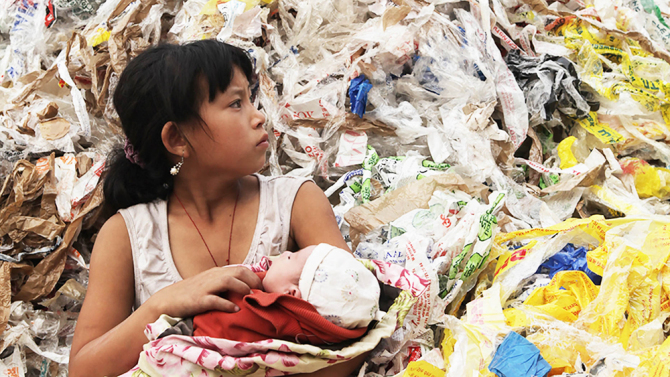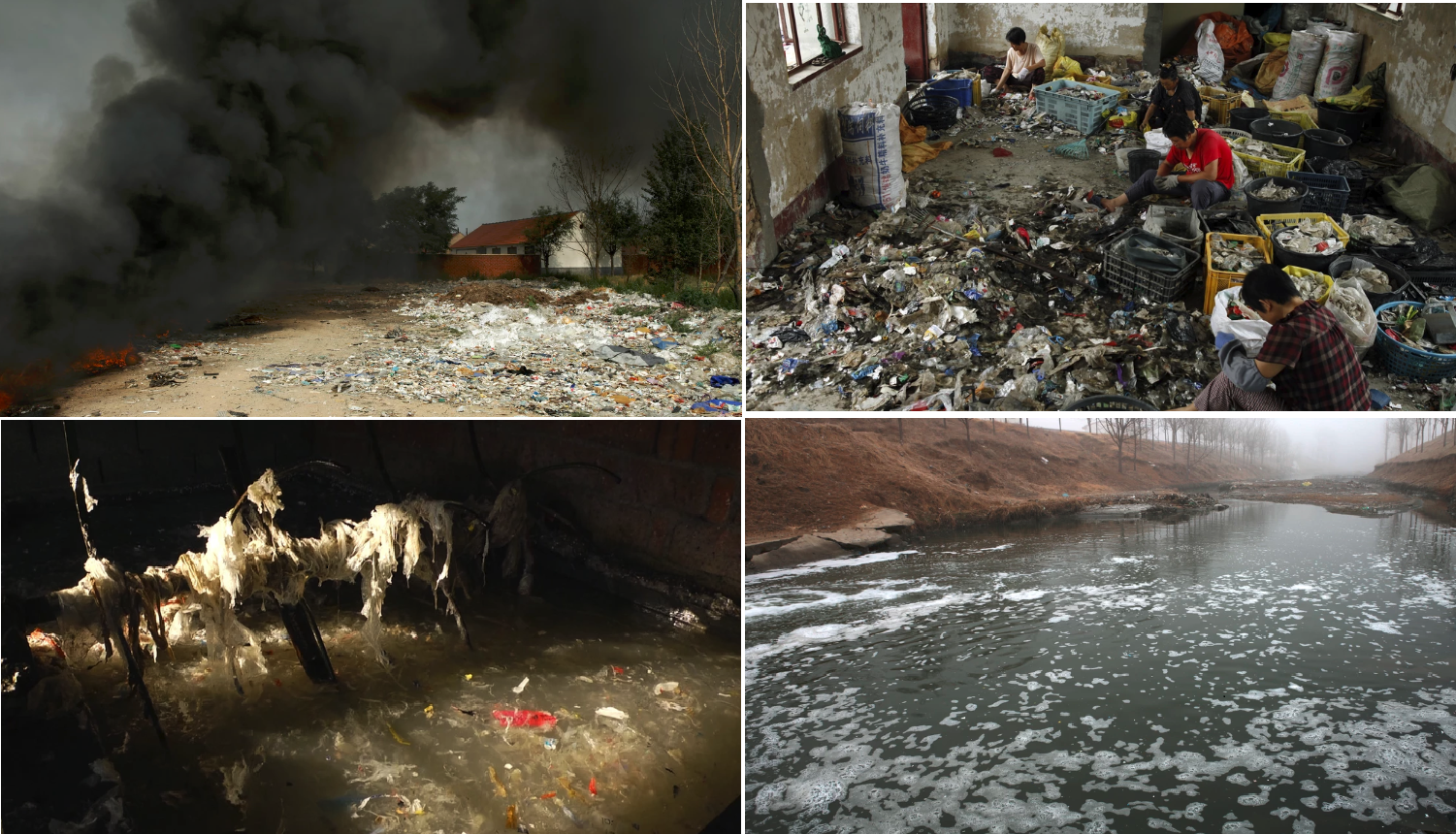Adam Liebman, Stanford University
Plastic China (2016) begins with a cargo ship pulling into Tsingdao Harbor in northern China, where shipping containers are mechanically loaded onto trucks. The documentary picks up the trail of one shipping container headed for rural Shandong Province. As the truck drives into a village, the film’s only scene-setting caption reads: “China is the leading importer of plastic wastes from Japan, Korea, Europe, and USA.”
The film thus follows a peculiar type of commodity that fills some of the containers of global-crossing cargo ships. In some contexts, these materials are considered “recyclables” or “scrap” (i.e. used or discarded matter that can be reused to produce new things). But the more negative-sounding “plastic waste” is an appropriate label, as the film goes on to show the incredible amounts of waste that is leftover, as well as toxicity released, through the unregulated process of converting post-consumer plastic packaging into the small pellets that can be sold as raw materials to manufacturers.
Yet, the focal point of the un-narrated documentary is not on waste, pollution, and toxicity. Rather, these themes constitute the film’s setting as viewers are taken into the intimate inner workings of one family-run plastic waste processing workshop, where a human drama unfolds involving everyday joys and struggles, play and suffering.
Yi Jie, an unschooled eleven-year-old girl, is the main character. Her father Peng works for the owner of the workshop and performs much of the manual labor along with his wife, other occasional hired hands, and the owner himself. Peng’s family—which includes an increasing number of children—long to go back home to Sichuan Province, but they are stuck living alongside the boss’ family amid small mountains of plastic waste. The children of the two families play together, making creative use of the waste world where they live. However, the relationship between boss and worker is not as harmonious. At times tensions erupt into arguing and violence: over wages, over Peng’s earnestness of work and the resulting quality of final products, and over whether to send Yi Jie to a local school. Yi Jie is torn between loyalty to her father, who drinks away a significant part of his meager earnings and wants her to stay home to take care of her younger siblings; and the boss, who wants to help her go to school and even offers to adopt her.

Sorting the Plastic
Yi Jie misses home and often appears unhappy, but she experiences a cheerful moment when talking with her Grandmother on the phone, prompting her to reminisce about life in Sichuan and to anticipate her return. The short phone conversation centers on a theme that can be used to analyze multiple aspects of the film: sorting.
Grandma: Is your dad working?
Yi Jie: Yeah, he is sorting the plastic.
– Will you help him? – Yeah. Really? Yep. Do you know how to sort plastic? – Yes, I do (proudly).
Yi Jie’s Mother: But you have to take care of the baby (chuckling).
Grandma: Will you be back soon? – In two months… (Yi Jie smiling widely) …I heard you are coming back, I’m so happy.
Yi Jie indeed must balance childhood play with helping take care of her siblings, other domestic work, and sorting plastic waste. Sorting mostly involves separating out the many kinds of worthless plastic and other garbage that gets thrown into recycling bins, from the plastic that can be processed (cut, washed, melted, and formed into pellets). Since roughly 5,000 households in the township are engaged in the plastic recycling business, excess waste is dumped everywhere, including in and around the fields where crops are still grown, and animals grazed. One farmer complains that his sheep started losing weight and when the butcher opened their stomachs, they were full of plastic.
In another troubling scene, the children discover dozens of dead fish floating in a river that is filled with garbage and foamy bubbles. The Peng family gathers the fish and fry them for a special festive meal. Although it is not clear where the fish came from and what caused them to die, the cloudy chemical baths necessary to wash plastic waste loom as a likely source. Piles of plastic waste are also often shown smoldering or completely on fire, while Yi Jie and her family use some of the excess plastic as a convenient and free fuel for cooking. The film does not contextualize the toxicity involved with such burning, but the smoke gives the film a gloomy and ominous ambiance; it is often there in the background, returning again and again to cloud the air.
The adults complain that the work is hard and dirty, and the plastic waste is smelly and disgusting. That the low budget processing of plastic waste might pose serious long-term health risks mostly goes unspoken, although this does not mean that there is no awareness or concern. Kun, the boss of the enterprise and implicit head of the household, points to three tumors growing on his back side. “Damn plastics! My body is broken.” Yet, he is afraid to do anything about it. “I don’t dare go to the doctors. What if there is something… something bad… What about my family?” Profit margins from the plastic recycling business are very thin, but Kun emphasizes that this is his only choice: “To make a living (singing sarcastically) … for my kids, for my parents.” School is expensive enough that Kun can hardly afford to send his son, while Peng cannot afford to send his daughter.

Sorting the People
The relationship between Kun and Peng becomes most strained when a buyer of the plastic pellets is unsatisfied with the quality, forcing Kun to adjust his price and lose a lot of money. Inadequate sorting seems to be the issue, and Kun scolds Peng: Why didn’t you sort carefully? You are responsible for it. You are wasting my plastic!” But Peng complains that he has worked loyally for years and that his wages that are far too low. He swears at the boss, then Kun swears back, standing over Peng aggressively and slapping his face twice, telling him to leave and never come back. After Peng drunkenly curses into the night from his separate living area, the dispute blows over and the work continues.
Although Kun is the boss, he is not wealthy by any means. The two farmer families have both been compelled to join an unsavory node of global industrial production where some of the most fundamental processes of capitalism take center stage. This includes the labor of sorting materials according to what is useful for production, without consideration of human health or environmental impact. It also includes a sorting of social roles into a worker and owner—two roles that determine an unequal distribution of value produced through the labor of sorting. As such, their tensions and disputes are the playing out of a certain form of power.
In many ways, the drama that unfolds between the two families and their struggles to make money could be seen in any small-scale industrial factory where the work is dangerous and damaging. However, there are some important specificities that come with the particular labor of processing post-consumer plastic waste imported from wealthier countries around the world. The origins of the waste are marked by foreign language labels and advertisements. Potentially anything could be in the waste, which not only causes apprehension and disgust, but also provides excitement at the possibility of finding “treasures.” Kun is delighted when he discovers an unopened foot cream, and finds a Korean video online showing how to use it. His wife tries it out later that night. Meanwhile, the children find balloons and other interesting items and toys.
Mostly, however, the children find images and leftover shells of commodities that they desire but will likely never consume or possess. While her father is blamed for sorting poorly, Yi Jie engages in an entirely different type of sorting as she meticulously cuts out and assembles images of the shoes, dresses, and other things that she would choose to purchase in a different life as a consumer. The boss also has fantasies of consumption, and he dreams of buying a new car after his old van starts breaking down. The two families go to see a car show and Kun is giddy while sitting in fancy cars that he thinks he might be able to afford someday. But Peng and Yi Jie look uncomfortably out of place, as they know that they will never be a part of this world. Back home, Yi Jie cuts out images of cars and the scantily-clad women that show them on the auto show floor and pastes them on paper, carefully curating her own miniature car show.
Eventually, the boss uses all the family’s money to secure a car loan and drives a shiny new car home across fields of burning garbage. He proudly shows it off to Peng and the neighbors. Shortly after, Peng finally decides to take his oldest two children back home to Sichuan. He takes Yi Jie and her brother to the train station, but they cannot acquire tickets because her dad does not have an ID card. Then they go to a bus station (where ID cards are not necessary), but Peng does not have enough money to pay for tickets. Being too poor to return home is a heartbreaking reality for Yi Jie. Dejected, the family has no choice but to return to the drudgery of working for Kun.
Later, the kids play a game in which Yi Jie sells train tickets out of a window and the younger boys come to buy. Yi Jie seems to enjoy having the power to both distribute tickets and deny them to those who do not have enough money, instead of being the one denied a ticket. Thus, not only does she dream of going home to rural Sichuan (where she has lots of friends and family, school is free, and agriculture is still dominant); also, she is learning to dream of occupying a different position a world where people are sorted into different categories—where some have the money to fulfill their needs and desires, and others are stuck sorting out the mountains of trash that remain.
Repercussions
The director and cinematographer of Plastic China, Jiu-Liang Wang, made the film in part to influence waste exporting countries to take responsibility for their own garbage. In July 2017, Wang’s efforts were bolstered when China’s Ministry of Environmental Protection notified the WTO that it would soon forbid importing four classes and twenty-four types of “solid wastes,” including post-consumer plastics. The announcement sent ripples through the global scrap recycling industry, which relied heavily on Chinese buyers for almost two decades. As the ban has gone into effect, commodity prices for many types of scrap have dropped to the extent that markets are collapsing, and exporting countries are indeed being forced to deal with their own waste. The brilliance of Plastic China, however, extends beyond efforts to redirect global flows of waste. The film captures an underworld full of agency, imagination, struggle, and inequality lurking across oceans, far from “recycling” bins, yet intimately tied to them. It thereby begs for deeper reflection into the complex relations between waste, value, toxicity, and justice.